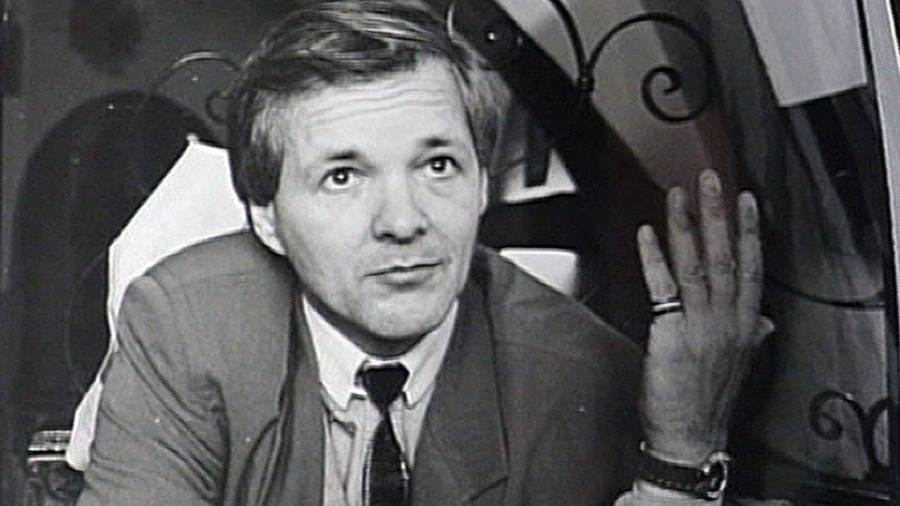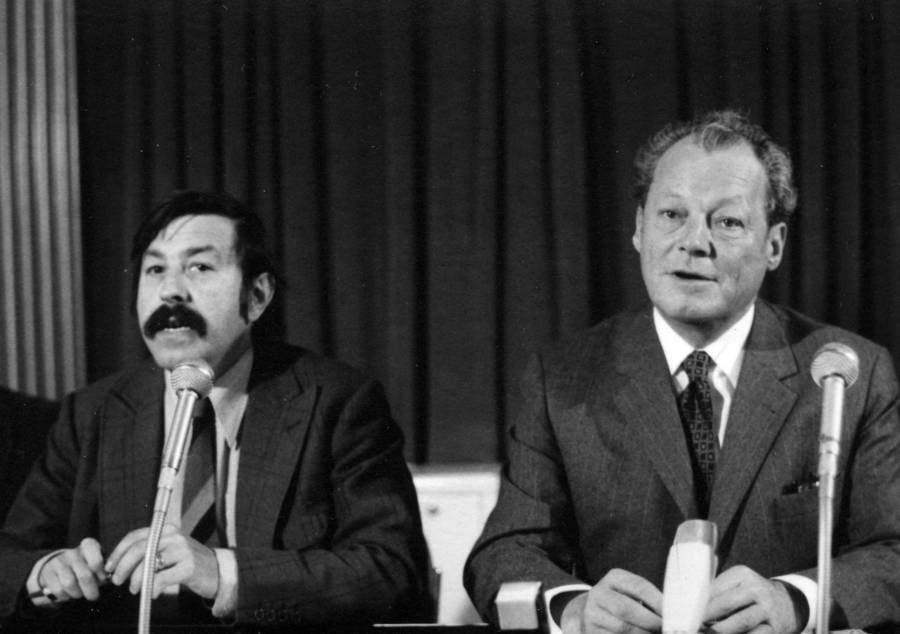Jack Unterweger went to prison for murder, then found fame as an author — before strangling several women to death in Austria and Los Angeles between 1990 and 1991.
Throughout the 1980s, Jack Unterweger was a model prisoner. He was living proof that, no matter what deeds one committed, it was never too late to turn things around.
After a life of crime including sexual assault and murder, Unterweger finally saw the light while serving his life sentence for that 1976 killing. In prison, he even wrote an autobiography and a series of poems so beautiful that they were being taught in Austrian schools and praised by Nobel Prize winners.

Serial Killers Documentaries/YouTubeJack Unterweger was serving a life sentence for murder when Austrian elites began to notice his literary skill.
Jack Unterweger showed the world that anyone could be redeemed — or so his supporters thought.
But all of that went up in smoke when, shortly after his early release in 1990, he went on a killing spree that saw him brutally murder at least nine women.
Jack Unterweger, From Murderer To Poet
When Jack Unterweger entered Stein Prison in 1976, his life sentence seemed to be the culmination of a long history of violence and crime. Born in central Austria in 1950, Unterweger had had a criminal record since assaulting a prostitute at the age of 16. Since then, he’d spent time in prison for a number of other violent offenses.
“I wielded my steel rod among the prostitutes of Hamburg, Munich and Marseilles,” he later wrote about his youth. “I had enemies and conquered them through my inner hatred.”

BiographyJack Unterweger wrote prolifically in prison, convincing many that he had been rehabilitated.
In December 1974, Unterweger killed 18-year-old Margaret Schäfer. In a pattern that Unterweger would repeat again and again, he murdered Schäfer by strangling her with her own bra.
He was soon caught, but tried to explain away his actions during his trial. He claimed that he had seen his mother’s face in Schäfer’s eyes as he killed her. If Unterweger thought that this would elicit sympathy — because he had been abandoned by his mother in his youth — he was mistaken and quickly sentenced to life in prison.
But once behind bars, something profound seemed to shift inside Unterweger as he began to write.
Previously illiterate, Unterweger learned to read and write and seemingly couldn’t stop. He wrote poems, short stories, novels, and plays. His book Endstation Zuchthaus (Terminal Prison) won a literary prize in 1984. Unterweger’s autobiography, Fegefeuer (Purgatory) zoomed to the top of the bestseller list and was adapted into a movie.
Soon, this prisoner’s miraculous prolificacy attracted the attention of Austria’s creative elite.
The Celebrated “Redemption” Of A Vicious Murderer

The Specialist/YouTubeIntellectuals in Austria rallied behind Unterweger, believing him to be proof that people can change.
Peter Huemer, an Austrian historian and talk show host, was enchanted by Unterweger’s autobiography, Purgatory. “It was authentic, a real cry,” he said. Meanwhile, author Elfriede Jelinek, who would later win a Nobel Prize for literature, raved that Unterweger’s autobiography had “clarity and great literary quality.”
“He was so tender,” Alfred Kolleritsch, a magazine editor, said later, after visiting Unterweger in prison. “We decided we had to get him pardoned.”
Thus, an unlikely campaign was born to acknowledge Jack Unterweger as both an artist and as a rehabilitated man. Soon, scores of intellectuals and government officials began campaigning for his early release. As a statement signed by supporters put it, “Austrian justice will be measured by the Unterweger case.”

Wikimedia CommonsGünter Grass (left), one of the Nobel Prize winners who fought for Jack Unterweger’s freedom, speaking at a conference.
Many saw Unterweger as an essential reminder that a person could rise above their circumstances. “Unterweger represented the great hope of intellectuals that, through the verbalization of problems, you can somehow get to grips with them,” Huemer said. “We wanted to believe him very badly.”
There were, however, some disconcerting signs within Unterweger’s growing body of work that he hadn’t completely shaken his obsession with murder and violence.
“No theme is more poetic than the death of a beautiful woman,” Unterweger wrote at one point. Another of his odes went: “You still seem strange and distant/ And lively, Death/ But one day you will be close/ And full of flames/ Come, lover, I am there./ Take me, I am yours!”
Nevertheless, the campaign to get him released worked. Fifteen years into his life sentence — the minimum required by Austrian law — Jack Unterweger was released from prison in May 1990. The prison governor declared: “We will never find a prisoner so well prepared for freedom.”
But just four months later, a prostitute was found dead, strangled with her underwear — just like Margaret Schäfer.
Can A Killer Change His Spots?

Getty ImagesThe Cecil Hotel has been a home for murder and tragedy for decades. Jack Unterweger stayed there in 1991.
The body count rapidly increased. Seven more women were murdered in the subsequent months, each following a chillingly similar pattern: The victims were prostitutes who had been strangled with their bras, then dumped in the woods. In other words, they were an echo of Jack Unterweger’s first kill.
But the newly-freed Unterweger seemed to have grown far beyond the violence that defined his early years. He’d become something of an Austrian literary sensation. He gave readings, staged his plays, and worked as a reporter. In fact, Unterweger established himself as a key journalist investigating the recent string of prostitute murders. Shamelessly, Unterweger interviewed Vienna’s chief of police and penned newspaper essays about the deaths.
Soon, Unterweger’s reporting work also brought him to the United States. There, he sought to investigate the “terrible conditions” suffered by American prostitutes. In Los Angeles, Unterweger checked into the infamous Cecil Hotel. The LAPD even gave him a ride-along with a patrol officer.
During his five weeks in Los Angeles, three prostitutes were murdered — strangled with their own bras.
The Final Capture Of Jack Unterweger

Leopold Nekula/Sygma via Getty ImagesAuthorities finally caught up to Unterweger after he’d killed 12 women in four countries.
By this point, enough bodies had piled up that Unterweger was beginning to attract the attention of authorities on both sides of the Atlantic Ocean. Police in Los Angeles matched the timeline of the prostitute murders with Unterweger’s stay in the city.
Then, Unterweger fled from the U.S. to Switzerland, then Paris, then back to Miami — where his story would, finally, begin its bloody conclusion. It was in Miami where authorities finally caught up with Unteweger and arrested him in February of 1992.
In the end, the FBI caught him by convincing him they were reporters from “Success” magazine, ready to pay him $10,000 for the chance to hear his story. Unterweger took the bait — and instead of sitting down with a doting reporter, he walked into a room filled with U.S. Marshals.
He’d relished the attention of the press ever since his writing career took off while in prison. Once released, he posed for high-fashion photo shoots and went on TV to discuss his beloved works, all while continuing to court his fawning press.
Ultimately, his love for attention was his undoing. After his capture, he was soon extradited back to Austria.
Still, many of Unterweger’s former defenders stood by their man. “If he was the killer, he would be one of the cases of the century,” stated Huemer. “Statistically, the chance that I would know one of the cases of the century is so unlikely that, therefore, I think he is not guilty.”
Jack Unterweger had lived a double life in more ways than one. During his trial, some women wept during the proceedings, believing Unterweger to be an innocent victim. Other women testified to his unsettling behavior. Eventually, several factors, including his lack of an alibi, led to Unterweger’s conviction on June 29, 1994.
That night, Unterweger hanged himself in prison. One Austrian politician dryly quipped that it was Unterweger’s “best murder.”
“I cannot bear going back into a cell,” Unterweger had said after his capture. He stayed true to his word and chose death over incarceration.
Following his death, even Jack Unterweger’s former defenders acknowledged that they had fallen for a myth.
“At the time, I genuinely believed that Unteweger was a reformed man,” said Peter Huemer. “But now I feel I was deceived, and that I am partly to blame.”
After this look at Jack Unterweger, read up on Richard Ramirez, another serial killer who once made his home at the Cecil Hotel. Then, read about Elisa Lam, the young woman who died mysteriously at the Cecil in 2013.





